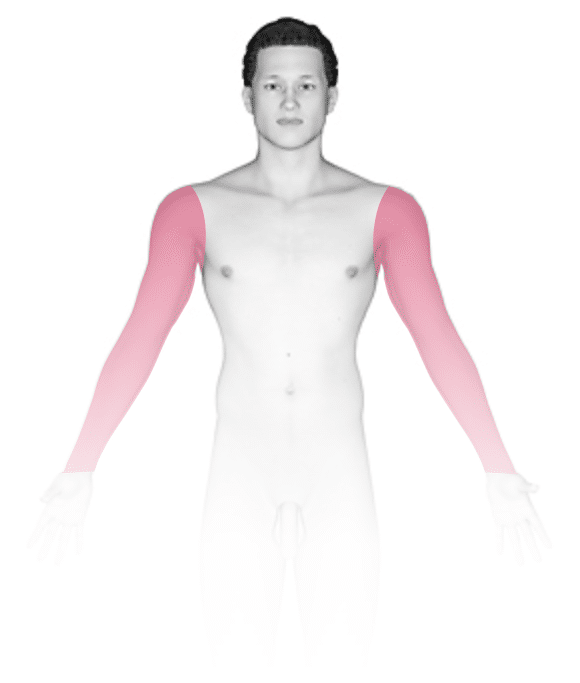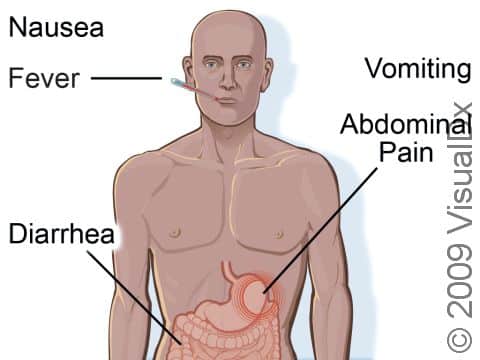Foodborne Illness (Food Poisoning), First Aid
Foodborne illness, commonly known as food poisoning, is typically caused by bacteria in food that has multiplied, either from poor handling, improper cooking, or poor storage. Toxins, parasites, chemicals, and viruses can also contaminate food and cause foodborne illness, but these causes are much less common than contamination from bacteria.
Botulism is a serious form of foodborne illness that can be very dangerous and cause paralysis and even death if not treated. Botulism toxins are most often found in honey, home-canned foods, and smoked meats.
Who's At Risk?
Foodborne illness can occur in any person shortly after ingestion of contaminated food. Illness may occur when a person eats food that was old, improperly prepared, or left at room temperature for over 4 hours. Sometimes the food tastes “off,” but there may be no indication that food has been contaminated until the symptoms of illness occur.
Certain people are more prone to foodborne illness than others, such as:
- Older adults – Older age plays a factor in sensitivity to foodborne illness because the immune system becomes slower to respond and weaker with increasing age.
- Infants and children – Younger age also plays a factor in sensitivity to foodborne illness, as young children’s and infants’ immune systems are not fully developed.
- Others with lowered immune systems – This includes people with diabetes or HIV infection, people undergoing therapy for cancer (ie, radiation or chemotherapy), and people who are pregnant.
Signs & Symptoms
Within hours or days of eating contaminated food, symptoms generally include diarrhea, nausea, abdominal pain, fever, and sometimes vomiting. Foodborne illness is often confused with influenza, as the symptoms are similar.
Symptoms of botulism include headache, dizziness, slurred speech, difficulty swallowing, and difficulty breathing occurring within 12-36 hours of contamination.
Self-Care Guidelines
First Aid Guide
If you become sick from foodborne illness, resting and drinking plenty of fluids is key.
- Drink electrolyte drinks or water to prevent dehydration.
- Once the illness subsides, slowly start eating only bland, easy-to-digest foods, such as crackers, plain toast, bananas, rice, and chicken. Stop eating if your nausea returns. Avoid dairy products, caffeine, alcohol, nicotine, and fatty or spicy foods while recovering from foodborne illness.
Note: Check with a medical professional before taking an antidiarrheal medication.
Foodborne illness can be prevented by following these general guidelines:
- Wash your hands before handling food.
- Wash your hands after using the toilet, changing diapers, smoking, blowing your nose, coughing, or sneezing.
- Wash your hands after touching raw meat or eggs.
- Use plastic (rather than wooden) cutting boards for cutting raw meat.
- Thoroughly clean all surfaces and utensils that came into contact with uncooked meat or eggs.
- Cook all meats and eggs thoroughly before eating.
- Do not eat or drink foods made from raw or undercooked eggs, meat, or unpasteurized dairy products.
- Wash all produce thoroughly before eating.
- Avoid cross-contamination of foods by keeping produce, cooked foods, and ready-to-eat foods separate from uncooked meat and raw eggs.
Treatments
For cases of severe foodborne illness, such as with botulism, the medical professional may clear out the digestive system by removing undigested food from the stomach and giving medications to induce bowel movements.
Maintaining adequate fluid and electrolyte balance and controlling blood pressure are important. Oral rehydration therapy may be administered, and dialysis may be needed in severe cases until the kidneys can function normally.
Visit Urgency
Foodborne illness often resolves on its own within 48 hours. Seek medical care if you are ill for longer than 2-3 days, have bloody stools, or are severely dehydrated.
Seek emergency medical care if:
- Symptoms are severe, such as diarrhea that turns bloody within 24 hours.
- Botulism poisoning is suspected.
Last modified on August 8th, 2024 at 4:55 pm

Not sure what to look for?
Try our new Rash and Skin Condition Finder
